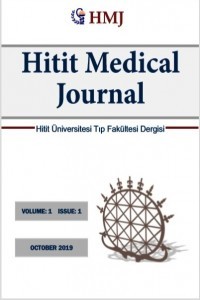Dabigatran Kullanımına Sekonder Nadir Görülen Ciddi Koagülopati
Dabigatran atriyal fibrilasyon (AF) varlığında oluşabilecek inmelerin önlenmesinde kullanılan oral direkt trombin inhibitörüdür. Vitamin K antagonistleri ve varfarin kullanımına kıyasla kanama yan etkilerinin daha az görülmesi ve laboratuar takibi gerektirmemesi açısından güvenle tercih edilebileceği savunulmaktadır. Bu yazıda dabigatran kullanımına bağlı ciddi kanama bozukluğu gelişen 83 yaşındaki bilinen kronik renal hasar, epilepsi, AF tanıları olan bayan hasta sunuldu. Oral antikoagülan ilaçlar atriyal fibrilasyon olgularında sistemik tromboemboliler ve iskemik inmelerin önlenmesinde önem arz etmektedir fakat vakamızda olduğu gibi ciddi kanamalara yol açabilmektedir. Renal yetmezlik gibi hastalığı olan yaşlı hastalarda antikoagulan ilaçların doz ayarlanması dikkatlice yapılması gerekmektedir. Vakamız dabigatran kullanımına bağlı kanama ile PT, aPTT ve INR değerlerinde belirgin uzamanın görüldüğü nadir vakalar arasında yer alması nedeniyle ilginçtir.
Anahtar Kelimeler:
Antikoagülanlar, Atriyal Fibrilasyon, Böbrek Yetmezliği, Dabigatran, Kanama
Rare Severe Coagulopathy Secondary Due to Dabigatran Use
Dabigatran is an oral direct thrombin inhibitor used to prevent strokes that may occur in the presence of atrial fibrillation (AF). Compared to the use of vitamin K antagonists and warfarin, it is argued that it can be safely preferred in terms of less bleeding side effects and not requiring laboratory follow-up. In this case-report, an 83-year-old female patient with known chronic renal damage, epilepsy and AF who developed severe bleeding disorder due to dabigatran use is presented. Oral anticoagulant drugs are important in the prevention of thromboembolism, but they can cause serious bleeding as in our case. In cases such as renal insufficiency, the dose of anticoagulant drugs should be carefully adjusted. Our case is interesting because it is among the rare cases in which a significant prolongation of PT, aPTT and INR values are observed due to bleeding due to dabigatran use.
Keywords:
Anticoagulants, Atrial Fibrillation, Dabigatran, Hemorrhage, Renal Insufficiency,
___
- 1- Antonijevic NM, Zivkovic ID, Jovanovic LM, et al. Dabigatran - Metabolism, Pharmacologic Properties and Drug Interactions. Curr Drug Metab. 2017;18:622-635. doi: 10.2174/1389200218666170427113504.
- 2- Wann LS, Curtis AB, Ellenbogen KA, et al. 2011 ACCF/AHA/HRS focused update on the management of patients with atrial fibrillation (update on dabigatran): a report of the American College of Cardiology Foundation/American Heart Association Task Force on practice guidelines. J Am Coll Cardiol. 2011;57:1330-7. doi: 10.1016/j.jacc.2011.01.010.
- 3- Stangier J, Stähle H, Rathgen K, Fuhr R. Pharmacokinetics and pharmacodynamics of the direct oral thrombin inhibitor dabigatran in healthy elderly subjects. Clin Pharmacokinet. 2008;47:47-59. doi: 10.2165/00003088-200847010-00005.
- 4- Hu A, Niu J, Winkelmayer WC. Oral Anticoagulation in Patients With End-Stage Kidney Disease on Dialysis and Atrial Fibrillation. Semin Nephrol. 2018;38:618-628. doi: 10.1016/j.semnephrol.2018.08.006.
- 5- Eikelboom JW, Wallentin L, Connolly SJ, et al. Risk of bleeding with 2 doses of dabigatran compared with warfarin in older and younger patients with atrial fibrillation: an analysis of the randomized evaluation of long-term anticoagulant therapy (RE-LY) trial. Circulation. 2011;123:2363-72. doi: 10.1161/CIRCULATIONAHA.110.004747.
- 6- Hijazi Z, Hohnloser SH, Oldgren J, et al. Efficacy and safety of dabigatran compared with warfarin in relation to baseline renal function in patients with atrial fibrillation: a RE-LY (Randomized Evaluation of Long-term Anticoagulation Therapy) trial analysis. Circulation. 2014;129:961-70. doi: 10.1161/CIRCULATIONAHA.113.003628.
- 7- Samuelson BT, Cuker A, Siegal DM, Crowther M, Garcia DA. Laboratory Assessment of the Anticoagulant Activity of Direct Oral Anticoagulants: A Systematic Review. Chest. 2017;151:127-138. doi: 10.1016/j.chest.2016.08.1462.
- 8- Kaide CG, Gulseth MP. Current Strategies for the Management of Bleeding Associated with Direct Oral Anticoagulants and a Review of Investigational Reversal Agents. J Emerg Med. 2020;58:217-233. doi: 10.1016/j.jemermed.2019.10.011.
- 9- Tomaselli GF, Mahaffey KW, Cuker A, et al. 2017 ACC Expert Consensus Decision Pathway on Management of Bleeding in Patients on Oral Anticoagulants: A Report of the American College of Cardiology Task Force on Expert Consensus Decision Pathways. J Am Coll Cardiol. 2017;70:3042-3067. doi: 10.1016/j.jacc.2017.09.1085.
- 10- Gottlieb M, Khishfe B. Idarucizumab for the Reversal of Dabigatran. Ann Emerg Med. 2017;69:554-558. doi: 10.1016/j.annemergmed.2016.11.025.
- Yayın Aralığı: Yılda 3 Sayı
- Başlangıç: 2019
- Yayıncı: Hitit Üniversitesi
Sayıdaki Diğer Makaleler
İskemi Reperfüzyon Hasarında Stres ve Hücre Ölümü
Ümmü Gülşen BOZOK, Ayşegül KÜÇÜK, Mustafa ARSLAN
Bedia ÖZYILDIRIM, Ayşe Nur BALCI YAPALAK, Sezanur Nazlı TÜRKOĞLU
Spor bilimlerinde yüzme konusundaki yayınların bibliyometrik analizi: tıbbi bir bakış açısı
Tuğrul ÖZKADI, Emre DEMİR, Turgut YILDIRIM, Esin Çağla ÇAĞLAR, İsmet ALAGÖZ, Gülçin AYDOĞDU
Dabigatran Kullanımına Sekonder Nadir Görülen Ciddi Koagülopati
Sema UÇAK BASAT, Ridvan SİVRİTEPE, Damla ORTABOZ, Ecem SEVİM
